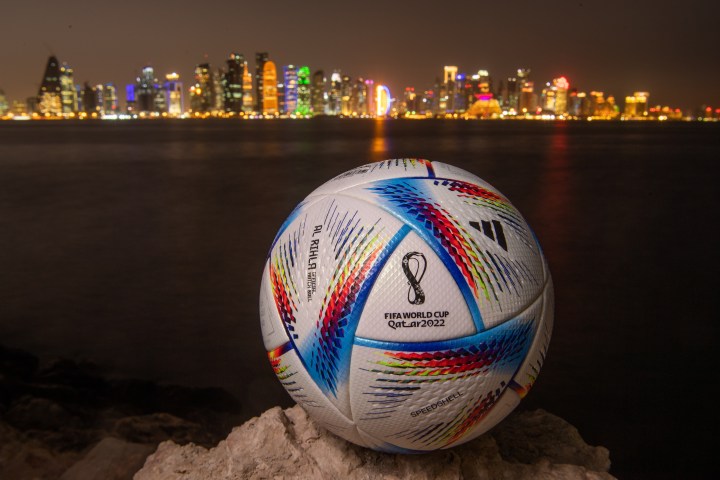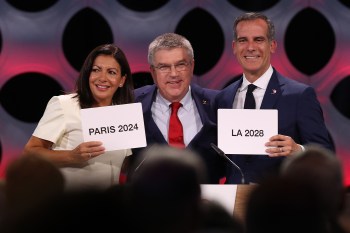
How expensive is it to host the World Cup or Olympics?
How expensive is it to host the World Cup or Olympics?

Marketplace’s “Econ Extra Credit” series focuses on one documentary a month with Marketplace themes. In the lead-up to the World Cup in Qatar this month, we’re watching the documentary film “The Workers Cup,” which delves into the lives of the migrant workers who were brought into the country to build infrastructure for the soccer tournament.
Qatar’s World Cup bid has spawned questions of economic viability since the beginning. The Persian Gulf state is roughly the size of Connecticut with a population of just under 3 million, and most of the tourist and sporting infrastructure had to be built at enormous expense — estimates range anywhere from $200 billion to $300 billion. Yet the return on investment for large sporting events is rarely positive. The Olympics are infamously pricey to put on, and the economic benefits for residents of the host city are questionable.
So, with the big price tag and not much to show in return, why do countries like Qatar, Russia and Brazil offer up billions of dollars to host global sporting events? According to Victor Matheson, a professor of economics at the College of the Holy Cross and a former Major League Soccer referee, they may be seeking to burnish their reputations through international media coverage.
“If you’re putting any sort of significant money into infrastructure like Qatar obviously is doing, there’s just no way you can make that back on ticket sales, on media rights, [or] on the amount of money you make from tourists coming to visit your country,” Matheson said in an interview with Marketplace’s David Brancaccio. “So obviously, you’re hoping for some sort of long-run benefits, some sort of legacy, and often that is an improvement in your reputation, either as a tourist destination or as a world player in some ways.”
The following is an edited transcript of their conversation.
David Brancaccio: So Qatar, it’s not going to make a formal profit — dollars in versus dollars out — on this thing, will it?
Victor Matheson: Well, it certainly won’t make a formal profit. It won’t make an informal one either. We’re talking about costs in the hundreds of billions of dollars and benefits, at least in the short run, in the tens of billions at most.
Brancaccio: You probably teach this to your students, right? I mean, there’s dollars, but there’s also something called goodwill, which often needs to be accounted for in a corporate balance sheet. That is worth something.
Matheson: No, so that is. And hosts of big mega-events like the Olympics and the World Cup, if you’re putting any sort of significant money into infrastructure like Qatar obviously is doing, there’s just no way you can make that back on ticket sales, on media rights, on the amount of money you make from tourists coming to visit your country. So obviously, you’re hoping for some sort of long-run benefits, some sort of legacy, and often that is an improvement in your reputation, either as a tourist destination or as a world player in some ways.
Brancaccio: And there’s a ghost that haunts all these big tournaments, right? It’s the name of a famous Canadian city: Montreal. 1976 Olympics. Boy, they ended up holding the bag for decades after that one.
Matheson: Right. So they didn’t end up paying off the last of their debts from that Olympics. Now, mind you, this was an Olympics that the mayor ensured us that “The Olympics can no more lose money than a man can have a baby,” a direct quote from the Montreal mayor at the time. But of course, they didn’t end up paying the last of their debts off for about 30 years on the big stadium they built for that. They called it “The Big Owe” in part because it was shaped like an O, in part because they owed money for it for 30 years.
Brancaccio: Owe, o-w-e — took a moment for the penny to drop. OK, so there’s the case in point of Montreal. But there’s also the case in point of a later Olympics: 1984, Los Angeles. They used a lot of existing infrastructure, and they ended up making a little money. Not a lot, but a little.
Matheson: Yeah. So the economics of the Los Angeles Olympics are fascinating. The reason they ended up making a bunch of money is because when it came time to look for bidders for the 1984 Olympics, they were the only bidder left. We had had a very uncomfortable Olympics in 1972 with the Israeli athlete disaster and terrorist event there. We’d had a huge financial disaster in 1976, we had had the Winter Olympics actually been handed back very unceremoniously to the [International Olympic Committee] by the voters of Denver. And so by the time it came for 1984, no one stepped forward, and Los Angeles said, “We’ll do it. But we’re going to dictate the terms of this Olympics to you rather than the IOC dictating it back to us.” And lo and behold, when you don’t goldplate everything and you don’t build everything brand new and you have a lot of infrastructure in place that they had had from the Olympics they had held 50 years before, it turns out you can actually run one of these things pretty well. The World Cup that’s going to be in the United States in the next four years, not the one coming up [this] month, but the one that’s coming up in four years, that’s going to likely be a profitable event because the United States is loaded with great sports and tourism infrastructure. But boy, is this not the case with Qatar.
Brancaccio: Back to Qatar, it hopes to generate something through goodwill. It’ll seem like more of a global player, perhaps, after this. But there is a potential downside for its image. For instance, human rights groups have been focused on the conditions under which the migrants who came to Qatar to help build this infrastructure, under the conditions under which they worked. And there are other human rights issues. Those can also be in focus when the world’s media is paying such close attention.
Matheson: Yeah, that’s exactly right. Of course, the whole hope here is that you want to focus the attention of the world on your city and/or your country. And therefore people know more about it. And when you’re a hidden gem, a place like Barcelona [Spain] that has wonderful tourist options that really were not as well-known back when they hosted the Summer Olympics in the ’90s, then letting people know about your country is an unambiguously good thing. On the other hand, the more people learn about the fact that Qatar is a very conservative country, very oppressive in many ways, the labor rights issues related to immigration and the immigrants that built the stadiums and the rest of the infrastructure, here’s a case where maybe knowing more about the country isn’t helpful for that country’s image. And I can’t imagine that they’re getting a fantastic tourism legacy. I don’t know that people are lining up from the rest of the world to go to Qatar once the World Cup is over in the same way that they did line up to go to Barcelona or go skiing in Salt Lake City after they held the Winter Olympics back in 2002.
Brancaccio: Professor, just before we go, I mean, you have another life too, don’t you? You’re a ref!
Matheson: So I actually have refereed in Major League Soccer and I’m still refereeing Division 1 college here. I have a couple of players that I’ve refereed that will be playing in the World Cup. And I’ll sure be tuning in, but it will be with a little bit of a sense of regret, like every time FIFA hosts one of these events.
Brancaccio: You may have to turn off the economics part of your brain to watch and to fully enjoy.
Brancaccio: That’s right. But again, when they’ve got this monopoly on this thing that we love, it’s very hard to disentangle your love for the sport for what, again, most economists and, again, you know, human rights activists say about this event. It’s very hard to disentangle those, you know, both the great spectacle that’s the sport and what’s clearly a dark side with this particular event.
There’s a lot happening in the world. Through it all, Marketplace is here for you.
You rely on Marketplace to break down the world’s events and tell you how it affects you in a fact-based, approachable way. We rely on your financial support to keep making that possible.
Your donation today powers the independent journalism that you rely on. For just $5/month, you can help sustain Marketplace so we can keep reporting on the things that matter to you.


















